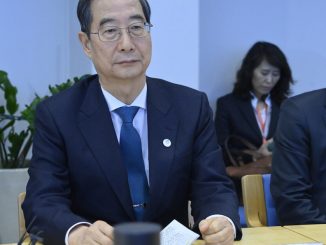
South Korea’s main opposition Democratic Party’s former leader Lee Jae-myung celebrates after winning the nomination as the June 3 presidential election candidate during a party’s convention in Goyang, South Korea, on April 27, 2025. Lee Jin-man/AP Photo
| Published May 30, 2025
Voting has already begun in a snap election that was sparked following a disastrous martial law declaration by the previous president in December last year.
Lee Jae-myung, leading candidate in the upcoming South Korean presidential election, is advocating for significant reforms to the country’s constitution, particularly regarding the martial law system. His proposals come amid growing domestic concerns about economic difficulties and regional security tensions, especially with North Korea and China.
Key Points:
-
Constitutional Revision on Martial Law:
Lee suggests revising the constitution to reform how martial law is declared and managed, aiming for a system that better balances national security with civil liberties. -
Economic Focus:
He highlights the need to tackle South Korea’s economic slowdown, rising inequality, and the impact of global supply chain disruptions. Lee also emphasizes boosting domestic industries and reducing dependence on foreign economies, resonating with protectionist and reformist sentiments. -
Security Concerns:
With heightened tensions in the Korean Peninsula and the Indo-Pacific, Lee advocates for strengthening South Korea’s defense capabilities, while also pursuing a pragmatic foreign policy that maintains strong alliances, particularly with the United States. -
Political Context:
Lee’s reform agenda is seen as a response to calls for modernization of South Korea’s political system, reflecting popular demands for greater transparency and efficiency amid a rapidly changing geopolitical landscape.
Implications of Lee Jae-myung’s Constitutional and Policy Proposals
1. Potential Shift in South Korea’s Security Posture
-
Revising martial law provisions could alter civil-military relations, possibly expanding government powers during emergencies.
-
Conservatives may worry this risks eroding civil liberties or enabling government overreach under the guise of national security.
-
On the other hand, it could also signal a stronger, more flexible response mechanism amid rising North Korean provocations and regional instability.
2. Economic Nationalism and Protectionism
-
Lee’s emphasis on domestic industry and reducing foreign dependency reflects a tilt toward economic nationalism.
-
This may lead to tighter regulations on foreign investment and increased government intervention in markets, which could concern free-market advocates.
-
However, it aligns with broader global trends of supply chain diversification and resilience-building post-COVID.
3. Impact on U.S.-South Korea Alliance
-
Lee stresses maintaining strong ties with the U.S., but his pragmatic approach might seek greater autonomy in foreign policy.
-
This could lead to a recalibration of military cooperation and diplomatic balancing between the U.S. and China, especially amid U.S.-China tensions.
-
Conservatives in the U.S. and South Korea may be alert to any shifts perceived as weakening the alliance or undermining deterrence against North Korea.
4. Domestic Political Reform and Stability
-
Constitutional revisions could reshape South Korea’s governance framework, potentially impacting election processes, emergency powers, and checks and balances.
-
This could either enhance governmental efficiency or raise concerns about consolidation of power, depending on implementation.
-
The move taps into popular calls for reform but also risks political polarization.
5. Regional Geopolitical Dynamics
-
South Korea’s moves toward reform and economic self-reliance could influence the broader Indo-Pacific power balance.
-
Lee’s policies might embolden Seoul to take a more independent role in regional security architecture, affecting relations with Japan, China, and North Korea.
Overall Takeaway:
Lee Jae-myung’s presidential bid signals a push for major constitutional reforms and a more assertive economic and security policy in South Korea. By proposing changes to martial law and emphasizing economic independence, Lee aims to modernize governance and address pressing domestic challenges amid rising regional tensions. While this agenda could strengthen South Korea’s ability to respond to security threats and economic shifts, it also raises concerns about government overreach and the future balance of power in U.S.-South Korea relations.
SOURCES: THE EPOCH TIMES – Frontrunner in South Korean Presidential Election Proposes Reforming Martial Law
REUTERS – South Korean presidential frontrunner proposes revising constitution on martial law
AL JAZEERA – South Korea set to break early voting record as presidential election looms
TIME MAGAZINE – Lee Jae-myung Aims to Steer South Korea Past Its Moment of Crisis and Mounting Challenges





Be the first to comment